North East

Guwahati: Every year on 10 December, Assam observes ‘Martyr’s Day’ or ‘Swahid Diwas’, commemorating the supreme sacrifice made by the people of the state in the historic Assam Movement from 1979 to 1985.
22-year-old general secretary of Barpeta AASU unit, Khargeshwar Talukdar, was the first person to be martyred in the Assam Agitation on December 10, 1979 at Bhabanipur. The Swahid Divas is observed to remember his sacrifice.
The Assam Agitation that started from 1979 to 1985 saw as many as 855 people give up their lives to protect the identity of the people of Assam. The movement, led by All Assam Students Union (AASU) and the ‘All Assam Gana Sangram Parishad; (AAGSP), developed a program of protests and demonstration to compel the Indian government to identify and expel illegal, (mostly Bangladeshi), immigrants and protect and provide constitutional, legislative and administrative safeguards to the indigenous Assamese people.
Also read: General Bipin Rawat’s funeral rites to be held today at 4 pm
The agitation program ended in August 1985 following the Assam Accord, which was signed by leaders of AASU-AAGSP and the then Prime Minister of India, Rajiv Gandhi.
Clause 5 of the Assam Accord deals with the issue of foreigners, that is, detection of foreigners in Assam, deletion of their names from the voters' list and their deportation through practical means.
The foreigners were classified under three heads for identification and differential treatment under Clause 5 of the Assam Accord. Two dates are of significance in the Assam Accord: 1st of January 1966 and 24th of March 1971.
"All persons who came to Assam prior to 1.1.1966, including those amongst them whose name appeared on the electoral rolls used in 1967 elections, shall be regularised," states Clause 5 of the Assam Accord.
In simple words, illegal immigrants who entered Assam till December 31, 1965 were to be granted citizenship with voting rights immediately.
Clause 5 of the Assam Accord further says, "Foreigners who came to Assam after 1.1.1966 (inclusive) and upto 24th March, 1971 shall be detected in accordance with the provisions of the Foreigners Act, 1946 and the Foreigners (Tribunals) Order 1964."
This means that those illegal immigrants who came to Assam between 1966 and March 24, 1971 were to be disenfranchised. This group of people was required to register themselves as foreigners in accordance the Registration of Foreigners Act, 1939.
The Assam Accord does not call for their deportation but they were to get voting rights only after expiry of 10 years from the date of their detection or declaration as foreigner.
The rest had to be expelled. Religious persecution was not a consideration for any relaxation in accommodating illegal immigrants.
Clause 6 is another often quoted provision of the Assam Accord to challenge the new amendment in the Citizenship Act. Clause 6 of the Assam Accord says that constitutional, legislative and administrative steps will be taken by the Centre to "protect, preserve and promote the cultural, social, linguistic identity and heritage of the Assamese people".
AASU sponsored the first general strike on 8 June 1979 demanding the detection, disenfranchisement and deportation of foreigners. This was followed by the formation of the All Assam Gana Sangram Parishad, an ad hoc coalition of different political and cultural organizations, on 26 August 1979. On 27 November 1979, AASU-AAGSP called for the closure of all educational institutes and picketing in state and central government offices. Mass picketing was arranged in front of all polling offices where candidate filed their nominations, in the first week of December 1979. No candidates were allowed to file nomination papers in the Brahmaputra valley (Mangaldoi).
On 10 December, the last date for submitting the nomination papers for 1980 Lok Sabha elections, was declared as a statewide bandh. The government proclaimed a curfew at different parts of the state, including the major city of Guwahati
At Barpeta, then IGP K.P.S. Gill led the police force in escorting Bagam Abida Ahmed to file nomination papers; they attacked protestors. Khargeswar Talukdar, the 22-year-old general secretary of Barpeta AASU Unit, was beaten to death and thrown into a ditch next to the highway at Bhabanipur. Talukdar was honoured by the Assam Movement as its first Martyr.
On 7 October 1982, while leading a procession from Nagaon to Hojai in support of a bandh called by the All Assam Students Union, Anil Bora was beaten to death at Hojai by people who opposed the bandh as well as the Movement.
Leave A Comment